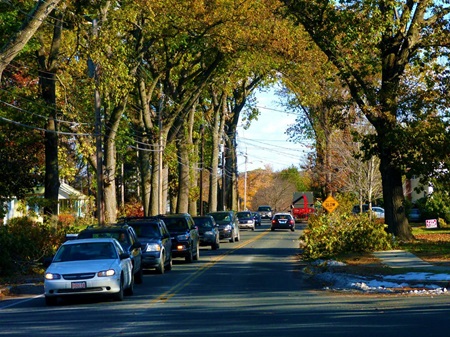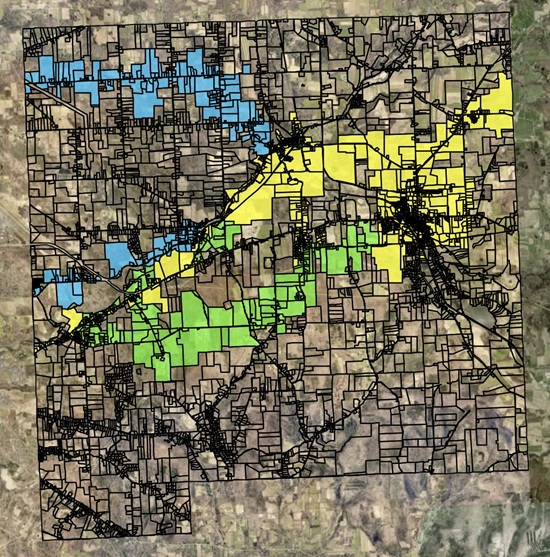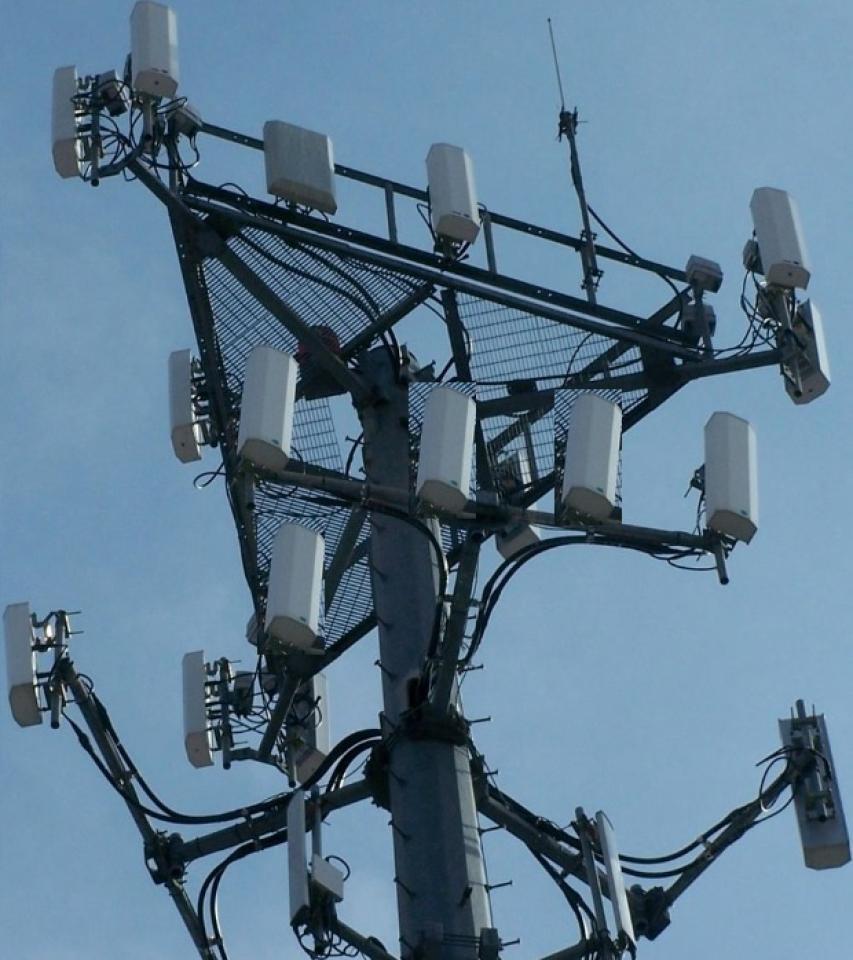
Fast, affordable Internet access for all.

West Springfield residents recently gathered to break ground on a plan to deliver affordable fiber access to all 28,000 city residents. The effort, first conceived in 2021 during the height of the pandemic, involves working with Westfield Gas and Electric's broadband subsidiary Whip City Fiber to deliver symmetrical gigabit fiber.
Whip City only currently offers residential customers one tier of service: symmetrical gigabit fiber for $75 a month. A recent OpenVault report found that the percentage of subscribers on gigabit speed tiers grew 29 percent last year, with one-third of subscribers now provisioned for gigabit speeds. Whip City users can also access phone service for an additional $20 a month.
The first subscribers should be lit up for service by the end of this year, officials say. It’s the culmination of a project that began in 2019 when city officials first considered the construction of a city-owned broadband network; emboldened in 2020 after city leaders and locals alike became frustrated by Comcast’s implementation of technically unnecessary and punitive usage caps.

In 2021 West Springfield voted to establish a public utility department tasked with creating a town-owned fiber-optic cable network. They urged locals to sign up for a $1.5 million pilot program in four local neighborhoods, and submitted applications to Verizon and Eversource to ensure access to utility poles to begin “make ready” fiber attachment preparations.
One year after launching a municipal fiber network, Dryden, NY officials say they’re making steady progress in their quest to expand affordable fiber broadband to the entire town of 14,500.
While the effort hasn’t been without obstacles, town leaders say the public response to their foray into broadband has been overwhelmingly positive.
“While there are challenges, we are continuing to make great progress in the buildout,” Dryden Town Supervisor Jason Leifer tells ILSR. “We have support from our residents, who continue to show interest in this project. We also have financial support from Tompkins County in the form of grants–and from neighboring municipalities who are interested in replicating our model.”
The city’s network began with a 50-home trial pilot trial in the southwest part of town. The broader $15 million network will be funded by a combination of bonds, $2 million in federal COVID-19 disaster relief funding, an Appalachian Regional Commission grant, and eventually, subscriber revenues.

The town took a phased approach to deployment, first by connecting the backbone of the network in the southeast of the city, followed by a focus on the western and eastern halves of the municipality, respectively. The Dryden fiber website features a build map that helps locals track network progress.
“We have currently passed over 420 addresses with our buildout,” freshly-appointed Dryden Fiber Executive Director David Makar tells ISLR. “This includes over 150 rental properties – mostly single family homes and apartments – as well as many owner occupied homes and businesses. We are still in phase one, and as we move into the village of Dryden and the hamlets of Varna, Ellis Hollow, and Etna, we will be in phase two.”
New England residents have been complaining about Verizon’s lack of meaningful fiber upgrades for the better part of the last two decades, prompting a steady parade of interest in community owned and operated fiber networks in states like Massachusetts.
But some of these community broadband efforts, such as West Springfield’s plan to deliver affordable fiber access to every city resident, are still being hampered by Verizon.
In 2021 the city (est. pop. 28,000) announced it would be partnering with Westfield Gas and Electric, the publicly owned utility in Westfield, Massachusetts, which has built and operates fiber networks in nearly two dozen communities in the Berkshires. The end result: Westfield Gas and Electric's broadband subsidiary Whip City Fiber plans to deliver West Springfield residents symmetrical gigabit fiber for $75 a month, without long term contracts or onerous hidden fees.
But efforts to launch a $1.8 million pilot project have been on hold thanks to ongoing delays by Verizon and Eversource to prepare local utility poles for fiber attachment, West Springfield Chief Technology Officer Stephanie Straitiff tells local news outlet The Reminder.
For over 20 years, the city of Palo Alto, the "Birthplace of Silicon Valley,” has flirted with the idea of building a city-owned municipal fiber network. Now after years of debate, numerous studies, several false starts, and many unfulfilled RFPs, city officials say they’re finally moving forward with a city-owned fiber network they hope will transform affordable broadband connectivity citywide.
Palo Alto officials tell ILSR that the project will be spearheaded by the city-utility, and deployed in coordination with a major upgrade of the city’s electrical systems. Phase One of the city’s planned fiber deployment should begin later this year, delivering fiber access to around 20 percent of the city–or 6,500 homes and businesses.
Phase One will be funded entirely from the utility’s existing cash reserves. Profits from that deployment will then be used to expand affordable, multi-gigabit fiber access to all of the city’s 63,210 residents. Though no shortage of challenges remain.
A Long Time Coming
That Palo Alto residents have been clamoring for better, more affordable alternatives to regional telecom monopolies for 25 straight years speaks for itself. The high costs, slow speeds, and abysmal customer service of regional telecom giants AT&T and Comcast have long driven the public’s unflagging interest in better, cheaper connectivity options.
After working over a year to obtain licenses to deploy fiber across town, by this time next week the central Connecticut town of Plainville, home to approximately 17,500 residents, will begin construction of a municipal fiber network. When finished, the network will connect all town offices, public education facilities, public safety services, and wastewater treatment facilities.
Over a decade after high-speed fiber connections linking the town’s municipal center and a local high school to the statewide Nutmeg Network were first established in Plainville, multiple municipal buildings throughout town still lacked reliable broadband connections, and some had not been connected to the Internet at all.
With locally-based construction firm Sertex set to begin laying fiber for the townwide institutional network (I-Net) next week, which will include “12.5 miles of aerial cabling and three underground spans running beneath major highways,” that’s all about to change for the relatively dense, 10-square-mile community, reports Sertex.

Snapshot
North Carolina Governor budgets $1.2 billion of Rescue Plan funds towards closing the digital divide
Vermont Senate includes private ISPs in what was a community-based solution to universal access
Alabama Governor approves $17 million in broadband grants, some to Comcast and Charter Spectrum
The State Scene
North Carolina
North Carolina Gov. Roy Cooper released a budget proposal last Wednesday that anticipates using $1.2 billion of incoming federal COVID-19 relief funds towards broadband infrastructure, affordability initiatives, and expanding digital literacy. With North Carolina set to receive a total of $5.7 billion in federal American Rescue Plan funds, Gov. Cooper is dedicating nearly one-fifth of the incoming relief to closing the digital divide.
Next, the State House, Senate, and the North Carolina General Assembly will create their proposals for how to spend the relief funding. Then, they'll have to rectify any differences. Each chamber's plans could look similar to the governor's or vastly different.
Gov. Cooper’s proposal specifically allocates [pdf]:
$600 million towards expanding broadband infrastructure, including: $350 million for the state’s existing last-mile grant program (GREAT grants), $150 million for competitive bidding which will allow county governments to leverage the funds for public-private partnerships, and $100 million towards stop gap solutions “to address local infrastructure needs and connect underserved households not likely to get fiber for three to four years.”
$420 million towards affordability initiatives which will subsidize low-income service plans.
$165 million for digital literacy, including: $40 million towards device support to provide computers to 96,000 households which currently lack them; $30 million towards break/fix services to replace devices for over 275,000 North Carolinians; and $95 million towards community-based digital literacy campaigns.
The plan aims to connect 100 percent of North Carolina households with children to high-speed Internet access by 2025, and anticipates the affordability initiatives in the proposed budget will provide 380,000 individuals with a $50/month subsidy for four years.
Snapshot
Florida Legislature rewrites utility pole bill to include language backed by municipal electric utilities
North Carolina’s County Broadband Authority Act includes clause drawing criticism from electric co-ops
Oklahoma Governor signs mapping bill, vetoes measure adding Tribal representation to state broadband council
The State Scene
Florida
A Florida bill, which included provisions that would have forced Florida’s municipal electric utilities and their ratepayers to pay private Internet Service Providers’ utility pole make-ready costs, was significantly revised before passing the State House by a unanimous vote of 115-0 on April 28.
H.B. 1239, which no longer includes the make-ready costs provisions, initially read like a regulatory wishlist for incumbent cable monopolies until it was redrafted to become a legislative package aimed at improving broadband deployment across the state. The revised bill now heads to the State Gov. Ron DeSantis for approval.
The final version of the bill establishes additional duties for Florida’s Office of Broadband, creates a state broadband grant program, and requires the Office to conduct mapping of unserved and underserved areas of the state -- a significant deviation from the version that was first introduced in February.
A pair of bills making the rounds through Florida’s state legislature are an attack on the state’s urban municipal electric utility ratepayers to the financial benefit of big cable monopolies, under the guise of expanding rural broadband.
H.B. 1239 and S.B. 1592 read like regulatory wishlists for Florida’s big Internet service providers. Word around the capitol is that the bills are heavily influenced by Charter Spectrum, the major incumbent cable Internet provider in the region (insiders also noted in an interview that it was sponsored by the Florida Internet and Television Association, of which Charter and Comcast are members).
H.B. 1239/S.B. 1592 would require municipal electric utilities to provide private companies with access to their poles at a capped rate, though the cost of attaching new telecommunications infrastructure differs based on size, shape, and weight. Florida’s municipal electric utilities, and their ratepayers, would be burdened with any additional costs that surpass the capped rate.
The bills would further require electric utilities to reengineer utility poles to accommodate broadband providers’ attachment requests within 90 days of receiving them. In some instances, municipal electric utilities would be forced to cover the full costs of pole replacements, rather than the new attacher.
At ILSR, we are concerned that make-ready policies do discourage competition and we have encouraged streamlined access and consistent, fair rates to ensure Internet service providers can pursue efficient deployment. However, this bill would force electric ratepayers, including residents and local businesses, to shoulder more of the burden for private firms like Charter Spectrum and AT&T with the latter avoiding paying their fair share of attachment costs.
A bill dedicating $150 million of anticipated federal funding to create a new state broadband office to coordinate and accelerate the expansion of high-speed Internet access throughout Vermont passed the State House of Representatives last week with overwhelming bipartisan support.
On March 24th, the Vermont House approved H.B. 360 by a vote of 145-1, backing the creation of the Vermont Community Broadband Authority. If the bill becomes law it would help fund and organize the deployment of broadband infrastructure between Vermont’s nine Communications Union Districts (CUDs) and their potential partners, which include electric distribution utilities, nonprofit organizations, the federal government, and private Internet Service Providers (ISPs).
The bill was introduced in the state Senate last Friday, and discussed for the first time in the Senate Finance Committee on Wednesday.
Enabled by a 2015 law, CUDs are local governmental bodies consisting of two or more towns joined together to build communications infrastructure. They were established to create innovative solutions to build broadband networks and provide a combination of Fiber-to-the-Home and fixed wireless Internet connectivity in their respective territories across Vermont, especially in areas where incumbent ISPs fail to provide adequate service.
Vermont’s CUDs, which have called for federal funding assistance since the onset of the pandemic, are ideally positioned to distribute funds in a way that will provide reliable and high-performance Internet access to every nook-and-cranny of the state. Vermont’s active CUDs have already constructed deep pockets of fiber.
Whether or not the CUDs will be able to reach the state’s goal of delivering universal 100/100 Megabits per second (Mbps) Internet service by 2024 now rests in the hands of Vermont’s Senate, Congress, and the Biden Administration as state and federal lawmakers wrestle with how to best expand access to broadband.
Last week, House Republicans introduced a bill package ostensibly to promote broadband expansion and competition across the country. In reality, the legislation is a wish list of monopoly cable and telephone companies that will protect them from competition and decrease their accountability to the public. It would also ban communities from building their own networks or engaging in public-private partnerships.
A Rights of Way Free-for-All
About a third of the bills in the Boosting Broadband Connectivity Agenda would preempt regulations (including application timelines and fee schedules) set by government subdivisions on wireless deployment. The major mobile carriers are already in the process of slowly rolling out 5G networks which will require the installation of hundreds of thousands of small-cell sites over the next several years. AT&T spent more than $23 billion on the recently concluded 3.7 GHz C-band auction, with T-Mobile spending $9.3 billion. Verizon outspent every other bidder combined at $45 billion. Establishing shorter shot clocks and maximum fees for the installation of new hardware in public Rights of Way would simultaneously reduce the income municipalities receive and lead to the proliferation of poles and attachments across the country with limited public input. We’ve already seen how it has negatively impacted cities like Milwaukee and Tucson.
